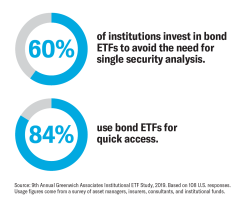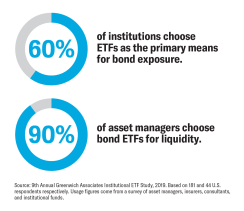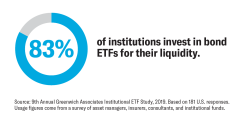1. The Challenge: Difficulty Accessing Niche Sectors
The Pain Point: Swallowing the Cost of Inefficiency
Emerging markets often play the role of a diversifier in fixed income portfolios – but at what cost? Individual emerging market bonds trade at an average spread of 40 bps1, but some investors feel that accepting these costs is the only way to achieve the diversification the bonds provide.

Find out how ETFs can be used for more efficient emerging market bond exposure.
2. The Challenge: Balancing Investment Performance with Liquidity Management
The Pain Point: Performance Drag
With an average bid/ask spread of 35 bps1, frequent trading in individual high-yield bonds doesn’t come cheap. To avoid these high costs, a high-yield manager might use a cash sleeve for all-important liquidity management – but that, in turn, can lead to performance drag.

3. The Challenge: Potentially Enhanced Yield Profile of Cash Allocation
The Pain Point: Excessive Cash Drag
Liquidity is top of mind for insurers – but individual bonds may not have the necessary liquidity required by insurance industry guidelines. One result of scarcer individual bond liquidity is that insurers might hold excess cash.

Find out how bond ETFs can be used for cash continuum and potential yield enhancement.
The above represent just three examples of how bond ETFs can help investors create solutions in a challenging fixed income market. Among the tools investors can potentially utilize, iShares bond ETFs are particularly versatile. More than 100 iShares bond ETFs seek to track various fixed-income sectors and segments of the global bond market. Holdings can include bonds of various types, such as TIPS, MBS, munis and corporate bonds, as well as duration lengths and credit quality. In short, iShares bond ETFs offer simple, fast, and efficient access to the fixed income market.
Learn more about how you can refresh and recharge your fixed income strategy.
1 Source: BlackRock as of 12/31/2019. All trade costs are estimates and not guarantees. Average spread is estimated by the average bid/ask spread.
For Institutional Use Only - Not for Public Distribution
Carefully consider the Funds' investment objectives, risk factors, and charges and expenses before investing. This and other information can be found in the Funds' prospectuses or, if available, the summary prospectuses which may be obtained by visiting www.iShares.com or www.blackrock.com. Read the prospectus carefully before investing.
Investing involves risk, including possible loss of principal.
Case studies shown for illustrative purposes only. This is not meant as a guarantee of any future result or experience. This information should not be relied upon as research, investment advice or a recommendation regarding the
iShares Funds or any security in particular.
Fixed income risks include interest-rate and credit risk. Typically, when interest rates rise, there is a corresponding decline in bond values. Credit risk refers to the possibility that the bond issuer will not be able to make principal and interest payments.
Non-investment-grade debt securities (high-yield/junk bonds) may be subject to greater market fluctuations, risk of default or loss of income and principal than higher-rated securities. Securities with floating or variable interest rates may decline in value if their coupon rates do not keep pace with comparable market interest rates. The Fund’s income may decline when interest rates fall because most of the debt instruments held by the Fund will have floating or variable rates. An investment in the Fund is not insured or guaranteed by the Federal Deposit Insurance Corporation or any other government agency and its return and yield will fluctuate with market conditions. An investment in fixed income funds is not equivalent to and involves risks not associated with an investment in cash.
International investing involves risks, including risks related to foreign currency, limited liquidity, less government regulation and the possibility of substantial volatility due to adverse political, economic or other developments. These risks often are heightened for investments in emerging/developing markets or in concentrations of single countries.
This information should not be relied upon as research, investment advice, or a recommendation regarding any products, strategies, or any security in particular. This material is strictly for illustrative, educational, or informational purposes and is subject to change. Transactions in shares of ETFs may result in brokerage commissions and will generate tax consequences. All regulated investment companies are obliged to distribute portfolio gains to shareholders. There can be no assurance that an active trading market for shares of an ETF will develop or be maintained.
The iShares Funds are distributed by BlackRock Investments, LLC (together with its affiliates, “BlackRock”).
The iShares Funds are not sponsored, endorsed, issued, sold or promoted by JPMorgan Chase & Co., or Markit Indices Limited, nor do these companies make any representation regarding the advisability of investing in the Funds. BlackRock is not affiliated with the companies listed above.
©2020 BlackRock. iSHARES and BLACKROCK are registered trademarks of BlackRock. All other marks are the property of their respective owners.
ICRMH0320U-1104491







